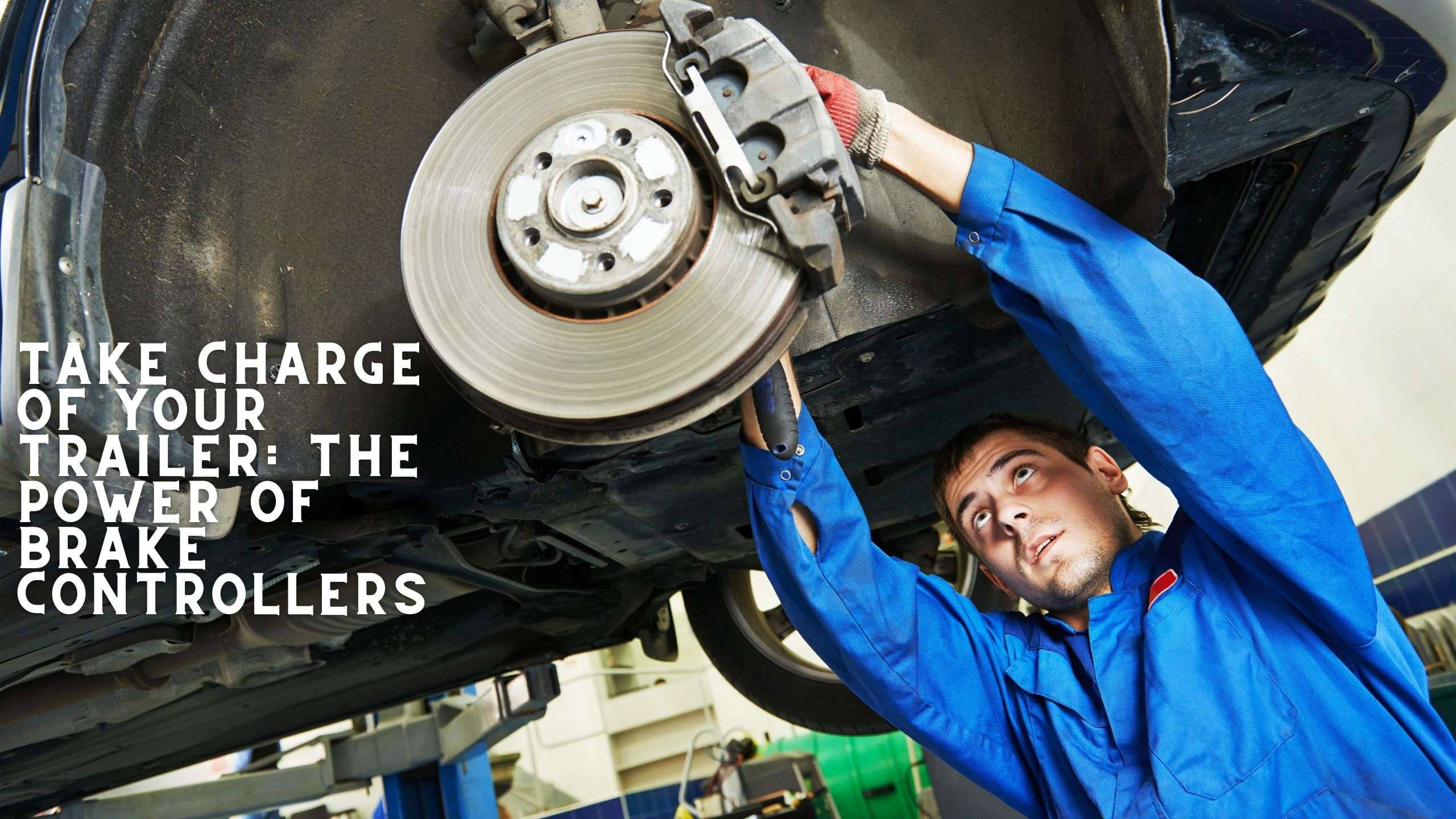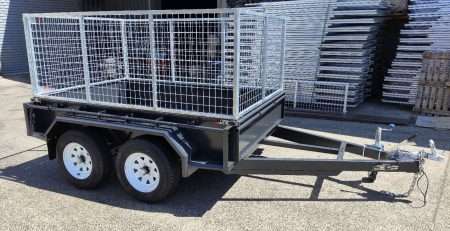
Take Charge of Your Trailer: The Power of Brake Controllers
Understanding Trailer Brake Controllers
When it comes to towing trailers, safety is paramount. One crucial component that aids in ensuring safety is the trailer brake controller.
What are trailer brake controllers?
Trailer brake controllers are devices that provide power to the brakes on a trailer, allowing the driver to control the braking force independently of the tow vehicle. Essentially, they are tools that activate the brakes on your trailer when you apply the brakes in your towing vehicle.
These devices enable drivers to control the electric brakes on a trailer from the comfort of the towing vehicle’s cab, providing better control and safety while towing.
Importance of Trailer Brake Controllers
The importance of trailer brake controllers cannot be overstated. These devices play a crucial role in ensuring safe and efficient towing. They function by applying the trailer’s brakes in proportion to the braking force that the towing vehicle applies. This ensures that the trailer brakes effectively without causing the trailer to skid or jackknife.
By providing independent control over the trailer’s braking system, brake controllers offer enhanced safety, particularly when towing heavy loads or navigating steep descents. Without a brake controller, the towing vehicle would bear the full responsibility of stopping both the vehicle and the trailer, which can lead to increased stopping distances and potential brake failure.
In addition, using a brake controller can prevent premature wear and tear on your towing vehicle’s braking system by distributing the braking force between the vehicle and the trailer. This makes brake controllers not only a safety device but also a valuable investment in the longevity of your towing vehicle.
Understanding trailer brake controllers and their significance is the first step in ensuring a safe and successful towing experience. As you prepare for your towing journey, consider other key components like trailer hitch locks, trailer lights and wiring, and trailer safety chains to ensure a secure and safe towing experience.
Types of Trailer Brake Controllers
When it comes to managing and maintaining control over trailers, brake controllers are a critical component. There are diverse types of brake controllers available on the market, each with their own distinct advantages and characteristics. Let’s explore the three main categories: time-delayed brake controllers, proportional brake controllers, and inertial brake controllers.
Time-Delayed Brake Controllers
Time-delayed brake controllers, as the name suggests, apply a preset amount of braking power at a specific rate. They deliver a predetermined power output to the trailer brakes at a fixed rate of time delay, irrespective of the towing situation (Curt Manufacturing).
Despite being a bit less precise than their counterparts, time-delayed controllers are popular due to their affordability and ease of use. They’re a highly viable option for infrequent towers or those on a tight budget.
Proportional brake controllers
Proportional brake controllers provide more precise braking control by applying the brakes on the trailer in proportion to the braking force applied to the tow vehicle. They offer a smoother and more controlled braking experience, making them the preferred option for many experienced tow vehicle operators.
These controllers use the brake pedal pressure of the towing vehicle to apply the trailer brakes in proportion to the vehicle’s deceleration, resulting in a seamless braking experience. While slightly more expensive than time-delayed controllers, the precision and control offered by proportional controllers make them well worth the investment.
Inertial brake controllers
Inertial brake controllers, also known as inertia-based brake controllers, employ accelerometers or other sensors to detect the deceleration of the towing vehicle. They apply the trailer brakes with a force proportional to the deceleration, providing smoother and more precise braking performance.
Inertia-based controllers are particularly beneficial when towing heavy loads or in situations where the towing vehicle’s deceleration may vary. While these controllers may have a higher price point, their advanced technology and superior performance often justify the cost.
The choice of the best trailer brake controllers depends on your specific needs and how frequently you plan on towing. By understanding the different types of brake controllers, you can make a more informed decision and ensure a safer towing experience. For more information on trailer safety, we recommend reading our articles on trailer hitch locks, trailer safety chains, and heavy-duty trailer hitches.
Choosing the Right Brake Controller
When it comes to ensuring safety and control while towing, selecting the appropriate trailer brake controller is crucial. With a variety of controllers available, making the right choice can seem daunting. In this section, we’ll discuss the factors to consider when choosing a brake controller and provide recommendations based on different needs.
Factors to consider
Several factors should influence your decision when selecting a brake controller for your trailer. These include:
- Type of Brakes on Your Trailer: Different brake controllers work best with specific types of brakes. For instance, hydraulic brake controllers are designed for trailers equipped with hydraulic brakes and use the hydraulic pressure from the tow vehicle’s brake system to control the trailer brakes.
- Nature of Towing: If you’re towing heavy loads or towing frequently, you might need a more advanced controller, like a proportional brake controller, which provides a smoother and more controlled braking experience.
- Budget: While investing in a high-quality brake controller is crucial for safety, your budget will naturally play a role in your decision. Research and compare different models to find a controller that offers the best value for your money.
- Ease of Installation and Use: A brake controller should be easy to install and operate. Look for models that come with clear instructions and user-friendly interfaces.
- Compatibility with Tow Vehicle: Ensure the controller you choose is compatible with your tow vehicle’s electrical system and has the necessary connections.
Recommendations for Different Needs
- For Occasional Towing: If you’re towing occasionally and handling lighter loads, a time-delayed brake controller could be a suitable option. These controllers apply a preset amount of braking power at a specific rate, which is generally adequate for less frequent towing or lighter loads (Family Handyman).
- For Regular Towing: For regular towing or heavier loads, a proportional brake controller provides more precise control. It applies the brakes on the trailer in proportion to the braking force applied to the tow vehicle, ensuring smoother and more controlled braking.
- For Hydraulic Brakes: If your trailer is equipped with hydraulic brakes, a hydraulic brake controller is the best choice. It uses the hydraulic pressure from the tow vehicle’s brake system to control the trailer brakes (Family Handyman).
Remember, the ultimate goal is to ensure safety and control while towing. While the brake controller plays a significant role, it’s also important to consider other trailer components such as trailer hitch locks, trailer lights and wiring, trailer leaf springs, and trailer safety chains to ensure a safe towing experience.
Installation and Usage
Once you’ve selected the right brake controller, the next step is to properly install it and understand how to adjust and test the controller for optimal usage.
Mounting your brake controller
The brake controller is usually mounted inside the tow vehicle, often near the driver’s seat, for easy access and adjustment. It’s vital that the controller be mounted in a location where it can be easily reached by the driver, such as under the dash or on the centre console. This ensures convenient access and adjustment while towing.
When mounting the brake controller, it’s important to ensure it’s securely attached. A loosely mounted controller can lead to inconsistent trailer braking and potential safety risks. For a secure installation, follow the manufacturer’s instructions that come with your specific brake controller. If you’re unsure about the installation process, it’s recommended to seek professional assistance.
Adjusting and testing your controller
Once the brake controller is properly mounted, the next step is to adjust and test it. This involves fine-tuning the controller settings to ensure optimal braking performance for your specific trailer and load.
The brake controller sends an electrical signal from your towing vehicle to the trailer brakes, causing them to engage and slow down the trailer. This means that the controller settings must be precisely adjusted to match the weight and braking requirements of your trailer.
The adjustment process typically involves setting the brake controller’s sensitivity and output levels. The sensitivity determines how responsive the controller is to the tow vehicle’s braking, while the output level controls the maximum power sent to the trailer brakes. Both settings should be adjusted according to the trailer’s weight, size, and brake system.
To test the brake controller, you should conduct a test drive in a safe, controlled environment. Apply the brakes several times at different speeds to ensure the trailer brakes are responding appropriately. Remember, the goal is to achieve smooth and synchronised braking between the tow vehicle and the trailer.
In conclusion, the installation and adjustment of the brake controller are critical steps in optimising the safety and performance of your trailer. Proper understanding and implementation of these steps can significantly enhance your towing experience. For more insights on trailer equipment and maintenance, check out our articles on trailer hitch locks, trailer lights and wiring, and trailer safety chains.
Innovative Solutions
In the world of trailer brake controllers, innovation is key. As technology evolves, so do the solutions available to us. One such advancement is the advent of Bluetooth trailer brake controllers, a cutting-edge solution that redefines convenience and flexibility in trailer braking.
Bluetooth Trailer Brake Controllers
Bluetooth trailer brake controllers, such as the Curt Echo, leverage wireless technology to provide control over trailer brakes. These controllers can be used with most vehicle-trailer combinations and offer seamless installation and setup, enhancing the overall towing experience.
The Curt Echo comes in three versions: the Curt Echo Mobile, the Curt Echo In-Line, and the Curt Echo Under Dash. Each version has distinct installation methods and locations, catering to different user preferences.
With Bluetooth trailer brake controllers, the need for a physical controller in the tow vehicle is eliminated. Instead, control over the trailer brakes is conveniently offered through a smartphone app.
Advantages and Concerns of Wireless Controllers
While Bluetooth trailer brake controllers offer undeniable convenience and adaptability, they also present unique challenges.
On the upside, these controllers allow for easy installation and broad compatibility with various vehicle-trailer combinations. They also eliminate the need for a physical controller in the tow vehicle, providing a cleaner, clutter-free environment.
However, potential concerns arise from their reliance on a wireless connection. While Bluetooth connections are generally reliable, the towing environment presents unique challenges that could potentially disrupt the connection (RV Miles).
As with any technology, it’s crucial to weigh the benefits against the potential drawbacks. In the case of Bluetooth controllers, their convenience and flexibility could certainly outweigh the potential for occasional connection disruptions.
In conclusion, these innovative solutions, when combined with other key trailer parts, can enhance your towing experience, ensuring safe and efficient operations. Always remember to keep abreast of the latest advancements in trailer technology to make the most of your towing operations.
Legal Requirements
When it comes to towing a trailer, safety is paramount, and so are the legal requirements. Trailer brake controllers are not only a crucial safety feature for your vehicle and trailer but also a legal necessity in many states.
State Regulations for Trailer Brake Controllers
Trailer brake controllers are legally required when the trailer exceeds a certain weight. The weight limit at which brake controllers become mandatory varies from state to state. For example, five states (CA, ID, NV, NH, and OR) require trailer brakes for trailers over 1500 lbs, while most states (36) set the requirement at 3000 lbs.
These regulations are in place to ensure the safety of all road users. A trailer brake controller allows for safe stops by activating the brakes on the trailer when you press the brake pedal in the tow vehicle. This prevents dangerous situations such as the trailer swaying or jackknifing during deceleration.
Safety Considerations and Compliance
While it’s essential to comply with state regulations, it’s equally important to consider safety factors when installing and using trailer brake controllers. Wiring the vehicle’s brake signal to the trailer is not advised, as it provides braking power 100% of the time and can quickly wear out the vehicle’s brakes. A brake controller helps the braking system on the towing vehicle and trailer communicate, offering a safer stopping distance and preventing trailer swaying during deceleration (Calgary Hitch Shop Blog).
The way trailer brake controllers operate is by applying the trailer’s brakes in proportion to the towing vehicle’s braking force. This ensures that the trailer brakes effectively without causing the trailer to skid or jackknife, providing improved safety and control (Capital One).
In addition to ensuring you have a proper brake controller installed, it’s important to keep all components of your trailer in good working condition. This includes regularly checking and maintaining trailer lights and wiring, trailer leaf springs, trailer safety chains, trailer hitch locks, trailer wheel bearings, and trailer tongue jacks.
Adhering to legal requirements and safety considerations not only helps you avoid potential fines and penalties but also ensures a safe and enjoyable towing experience.
Author
I am Rahatul Ashiq Tamal. Another author of Muscle Trailers. Muscle Trailers is a well-known trailer brand in Sydney, Melbourne & Adelaide

How to Mount a Spare Tire on Your Trailer: A Simple Step-by-Step Guide
Trailer service centers receive over 1 million phone calls and 1.3 million emails each year about trailer maintenance problems....

How to Fix RV Roof Leaks: Simple Roof Leak Detection Guide for Beginners
Did you know DIY RV roof repairs can cost under $50? But undetected leaks could lead to substantially higher repair...

Starting a Food Truck Business in Australia: From Trailer Selection to Launch
The Australian mobile food market has evolved into a billion-dollar industry. This makes a food truck...
